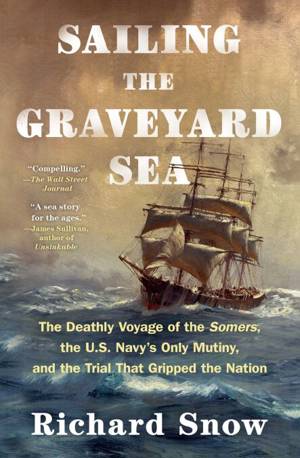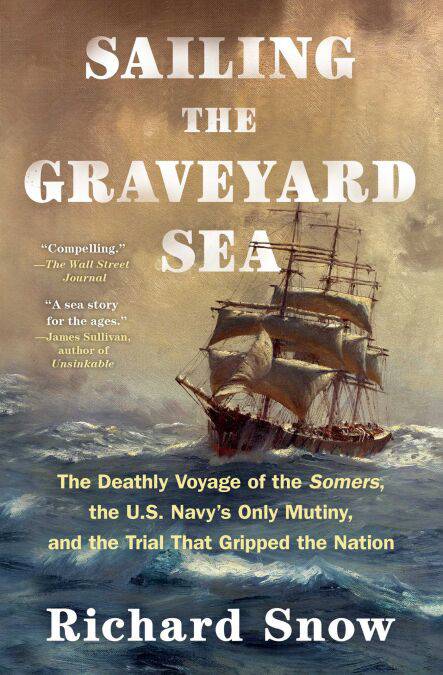
- Retrait gratuit dans votre magasin Club
- 7.000.000 titres dans notre catalogue
- Payer en toute sécurité
- Toujours un magasin près de chez vous
- Retrait gratuit dans votre magasin Club
- 7.000.0000 titres dans notre catalogue
- Payer en toute sécurité
- Toujours un magasin près de chez vous
Sailing the Graveyard Sea EBOOK
The Deathly Voyage of the Somers, the U.S. Navy's Only Mutiny, and the Trial That Gripped the Nation
Richard Snow
Ebook | Anglais
15,65 €
+ 15 points
Format
Description
A “compelling” (The Wall Street Journal) account of the only mutiny in the history of the United States Navy—a little-known but once notorious event that cost three young men their lives—part murder mystery, part courtroom drama, and as propulsive and dramatic as the bestselling novels of Patrick O’Brian.
On December 16, 1842, the US brig-of-war Somers dropped anchor in the New York Harbor at the end of a voyage intended to teach a group of adolescents the rudiments of naval life. But this routine exercise ended in catastrophe. Commander Alexander Slidell Mackenzie came ashore claiming he had prevented a mutiny that would have left him and his officers dead. Some of the thwarted mutineers were being held under guard, but three had already been hanged at sea: Boatswain’s Mate Samuel Cromwell, Seaman Elisha Small, and Acting Midshipman Philip Spencer, whose father was the secretary of war, John Spencer.
Eighteen-year-old Philip Spencer, according to his commander, had been the ringleader who encouraged the crew to seize the ship and become pirates so that they might rape and pillage their way through the northern coast of South America and the Caribbean. While the young man might have been fascinated by stories of pirates, it soon became clear the order that condemned the three men had no legal basis. And, worse, it appeared possible that no mutiny had actually occurred, and that the ship might instead have been seized by a creeping hysteria that ended in the sacrifice of three innocents.
Months of accusations and counteraccusations were followed by a highly public court-martial that put Mackenzie on trial for his life, and a storm of anti-Navy sentiment drew the attention of such leading writers of the day as Herman Melville and James Fenimore Cooper. But some good did come out of it: public disgust with Mackenzie’s hapless “training” gave birth to Annapolis, the distinguished naval academ that within a century would produce the mightiest navy the world had ever known.
Vividly told and filled with tense shown directly in court-martial transcripts, Richard Snow’s masterly account of this all-but-forgotten episode is “a hell of a yarn” (Kirkus Reviews) and naval history at its finest.
On December 16, 1842, the US brig-of-war Somers dropped anchor in the New York Harbor at the end of a voyage intended to teach a group of adolescents the rudiments of naval life. But this routine exercise ended in catastrophe. Commander Alexander Slidell Mackenzie came ashore claiming he had prevented a mutiny that would have left him and his officers dead. Some of the thwarted mutineers were being held under guard, but three had already been hanged at sea: Boatswain’s Mate Samuel Cromwell, Seaman Elisha Small, and Acting Midshipman Philip Spencer, whose father was the secretary of war, John Spencer.
Eighteen-year-old Philip Spencer, according to his commander, had been the ringleader who encouraged the crew to seize the ship and become pirates so that they might rape and pillage their way through the northern coast of South America and the Caribbean. While the young man might have been fascinated by stories of pirates, it soon became clear the order that condemned the three men had no legal basis. And, worse, it appeared possible that no mutiny had actually occurred, and that the ship might instead have been seized by a creeping hysteria that ended in the sacrifice of three innocents.
Months of accusations and counteraccusations were followed by a highly public court-martial that put Mackenzie on trial for his life, and a storm of anti-Navy sentiment drew the attention of such leading writers of the day as Herman Melville and James Fenimore Cooper. But some good did come out of it: public disgust with Mackenzie’s hapless “training” gave birth to Annapolis, the distinguished naval academ that within a century would produce the mightiest navy the world had ever known.
Vividly told and filled with tense shown directly in court-martial transcripts, Richard Snow’s masterly account of this all-but-forgotten episode is “a hell of a yarn” (Kirkus Reviews) and naval history at its finest.
Spécifications
Parties prenantes
- Auteur(s) :
- Editeur:
Contenu
- Nombre de pages :
- 304
- Langue:
- Anglais
Caractéristiques
- EAN:
- 9781982185466
- Date de parution :
- 20-11-23
- Format:
- Ebook
- Protection digitale:
- Adobe DRM
- Format numérique:
- ePub

Les avis
Nous publions uniquement les avis qui respectent les conditions requises. Consultez nos conditions pour les avis.






